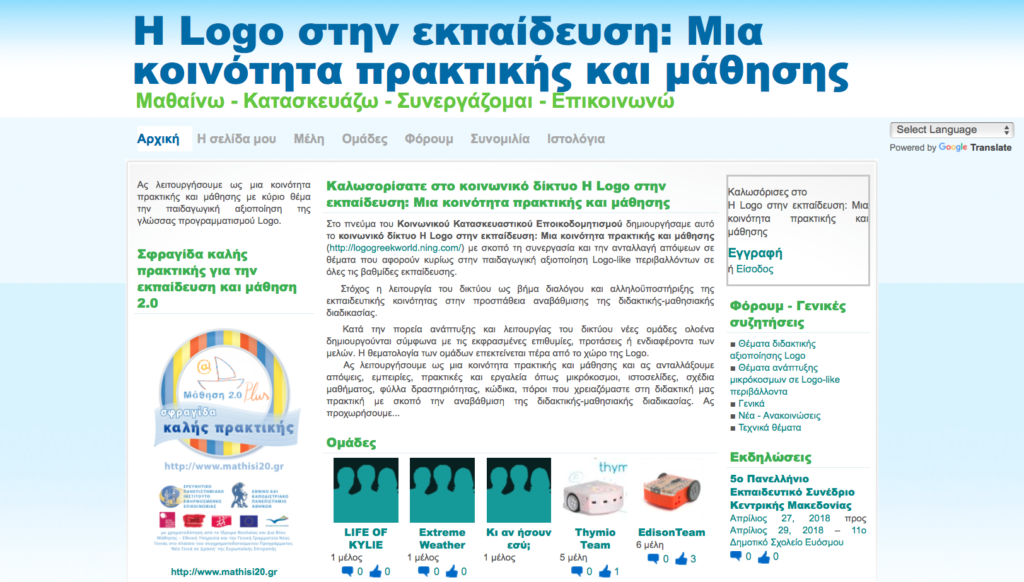Expert: Katerina Glezou, Educator – Teachers Trainer, A΄ Arsakeio Geniko Lykeio Psychikou, Philekpaideutiki Etaireia
Location: Athens – Greece
Website: here
Type of workshop: Incorporating online social networking services into teaching practice – Creating communities of practice and learning
Ages: 14-18 years old
- Description
This practice involves the use of educational social networks in teaching and learning with the ultimate goal of upgrading the didactic – learning process while at the same time developing group cooperation.
To do this, the educator uses the Greek online educational social network “Logo in Education: A Community of Practice and Learning” as well as teaching interventions for its exploitation.
The class creates an online group as a small community of networking learning within the network where they add conversations focused to the interests of learners and/or the teacher, they submit and exchange ideas, suggestions, research questions and solutions, educational material, worksheets, they upload files of interest and provide feedback to each other.
- Background of practice
The methodologies used are project-based and hands-on learning enhanced by the use of new technologies.
For the realization of the activity it is important that all participants have access to the digital tools, sometimes in teams and other times individually. The need for this workshop was primarily the observation that children are often passive viewers and not active participants in the learning procedure.
Discussion forums are being used as well as, blogs, chat, wiki, web tools for work evaluation, web tools for collaborative work.
- What is being learned-skills developed
By participating in an online group, students are involved in activities where they are invited to use online tools for communication and collaborative work. Students communicate and collaborate, exchange ideas and materials, they learn to give feedback to each other.
Other aspects that are promoted in the activity are:
- use of the online social networks as tools
- continuous searching and updating for new online social networking tools and new approaches for exploitation - use of democratic processes
- communication, interaction and collaboration between pupils and between pupils and teachers
- cultivating the concept of an active democratic citizen who communicates, participates, creates and cooperates as a team member
- good online behavior
- prevention of social exclusion and school bullying
- openness, authenticity, flexibility and elasticity of the teacher for equal treatment of pupils and situation management
- Successes – Difficulties
- The use of online social networking tools in the classroom is an approach that stimulates pupils’ interest.
- Participating in an online group and actively engaging in collaborative activities mobilizes pupils as it is something new to them, something unusual in the common didactic-learning process.
- Searching for materials and creating new ones, filing personal suggestions, thoughts, and exposure to the team creates incentives to work more responsibly on the subject of the deal.
- Furthermore, the network enables its members to have free access to the material regardless of time and place, keeping a record of the workflow, and thus promoting reflection.
FOR MORE DETAILS
SEE PAPERS:
- Educational online social networking in Greece: A case study of a Greek educational online social network
- Educational online social networking in tertiary education – A teaching intervention
